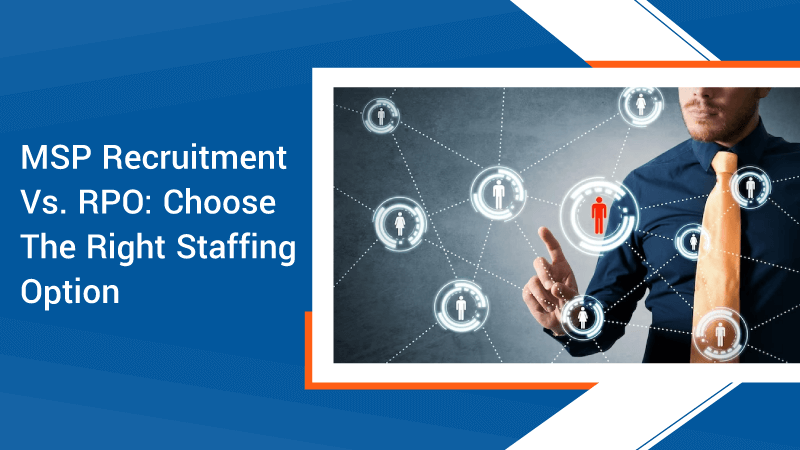Many people mistakenly believe that staffing is merely about filling vacant positions; however, the reality is more nuanced. The goal is to find an individual who not only fits the job requirements but also aligns with the company’s vision and culture.
Recognizing the complexity of this task, many organizations choose to outsource their hiring processes to third parties. This proves particularly beneficial for mid-size companies focusing on core activities. If you’re in the market for a third-party hiring firm, you’ll likely come across terms like RPO and MSP recruitment when doing your research. Wondering what sets them apart? Which one aligns with your unique needs?
This comprehensive blog explores the distinctions, helping you in making an informed decision based on your specific requirements.
A] What Is Managed Services Provider Staffing?
An MSP is an external company that operates hiring from IT internal workforce management, payroll, HR, procurement, sourcing, and much more. But in recent years it has become popular for its contingent workforce expertise.
They handle various processes and functions on behalf of your company to improve operational efficiencies and cut costs. Cost control is all about the management of costs and staffing needs, ensuring that the organization does not overpay for unneeded talent and underpay for deserving talent while providing tailored workforce solutions.
B] What Is Recruitment Process Outsourcing?
Recruitment Process Outsourcing (RPO) is a business process wherein a company delegates a significant portion or the entirety of its recruitment process to an external organization. This establishes a long-term partnership between the company and the RPO entity.
The RPO, in turn, strives to deliver the most suitable candidates for full-time positions, contributing to the growth of your business. Choosing outsourcing through an RPO provides the flexibility to scale your workforce up or down in response to high or low-demand periods. It proves beneficial when in-house teams require additional support, particularly during phases of low-volume recruitment or for one-off staffing needs.
C] Traditional Staffing vs. Managed Services: A Head-To-Head Comparison
1. Partnership
Recruitment Process Outsourcing (RPO) and Managed Service Providers (MSP) are two different approaches to workforce management. RPO specializes in one-to-one candidate delivery for the permanent workforce, sources candidates independently through its network, assume responsibility for a part or all of the recruitment process, and supplements the end client’s HR department with a dedicated recruitment team.
2. Staffing Process
In regular staffing, the idea is to hire people directly, often through recruitment model agencies or the company’s HR team. It involves handling everything from finding candidates to hiring and getting them started. This method works well for short projects or specific skills, giving the company flexibility and control over its workers.
In contrast, managed services do things differently by getting an outside party to manage the workforce. They focus on making the process more efficient and following the best ways of doing things. A partner in the recruitment agency staffing process looks at how things are currently done, finds ways to make them better, and suggests good practices. This not only speeds up the time it takes to fill a job but also makes things smoother for candidates by giving them timely feedback and clear instructions for what comes next. Unlike staffing agencies, which often just focus on hiring one person at a time, managed services take a broader look to make the whole staffing process better.
3. Pricing
When it comes to payment, MSPs and RPOs take different approaches. MSPs receive a portion of the wages of the temporary candidates they select, it’s like earning a commission from those worker’s salaries.
On the other hand, RPOs offer various payment structures. Some charge a consistent monthly fee for comprehensive management, while others opt for a per-hire arrangement. Hybrid models exist too, combining a monthly fee with a charge for each person they assist in hiring. RPOs require companies to handle the costs associated with identifying and hiring the specific skills they need.
4. Quality Of Hire
Choosing between traditional staffing and managed services depends on your industry’s stability and hiring needs. Traditional staffing is solid if your industry doesn’t have ups and downs throughout the year. If you have the time and budget, it’s great for training new hires properly. With advanced tech and experienced recruiters, managed services expedite hiring for immediate needs.
Both staffing agencies and RPOs vet candidates through resume screening and initial interviews. Leading RPOs offer unbiased talent assessments, ensuring only top-performing, diverse candidates proceed. Staffing agencies rely on existing assessments. The decision hinges on your industry dynamics and preference for hands-on training or quick, tech-driven hires.
5. Technology
RPO providers, rely on a high-tech applicant tracking system (ATS) to manage their big list of candidates. This helps them handle requests, organize candidates, keep track of interviews, and make the onboarding process easier. Both MSPs and RPOs use technology to make managing the workforce easier and more effective.
6. Flexibility
Recruitment Process Outsourcing (RPO) and Managed Service Providers (MSP) approach staffing flexibility differently. RPOs specialize in permanent staff, collaborating with HR and staffing companies for comprehensive recruiting solutions. They cover various hiring needs, from high volumes to project-based demands, providing scalable staffing solutions for both permanent and temporary roles.
Conversely, MSPs address flexible workforce requirements and large-volume hiring, focusing solely on managing the contingent workforce. Using a Customer Management System (CMS), they source candidates and oversee the contingent workforce. The choice between RPO and MSP hinges on the organization’s unique workforce and hiring demands.
Further Read: What Questions Should You Ask When Hiring An MSP Staffing Firm?
Conclusion
When deciding between RPO and MSP, it’s crucial to understand your specific needs. By aligning your recruitment goals with plans, you can figure out which model is the right fit for your business. RPO is great for finding skilled full-time employees for your organization, while recruitment agencies are handy for specialized skills, temporary roles, or specific locations.
If you want to fill many temporary positions and build a pool of potential candidates, an MSP is the way to go. MSP staffing services provide access to multiple clients for contingent placements and help implement successful contingent workforce management strategies.
Each option caters to different aspects of your recruitment needs, so the best choice depends on your organization’s specific goals. At Vertical Talent Solutions, we are an MSP-focused IT recruitment agency helping organizations find the right talent. Feel free to contact us if you have any questions or looking for similar services.

Ted White is the President & CEO of Vertical Talent Solutions and has over two decades of IT recruiting experience. Specializing in assisting Managed Service Providers in securing their ideal roles, his expertise navigates career paths precisely. Connect with Ted White for tailored recruitment solutions today.
